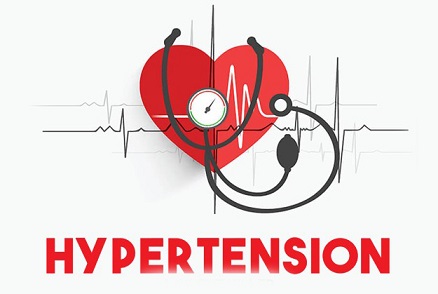Nikhil Prasad Fact checked by:Thailand Medical News Team Oct 06, 2024 1 year, 4 months, 6 days, 20 hours, 13 minutes ago
Medical News: Hypertension, or high blood pressure, continues to be a leading cause of cardiovascular disease and premature death globally. Despite the availability of numerous antihypertensive drugs, many patients still struggle to achieve optimal blood pressure control. Researchers from “Grigore T. Popa” University of Medicine and Pharmacy in Romania, along with colleagues from other prestigious institutions, have uncovered new pharmacological targets that could revolutionize the treatment of hypertension.
 New Approach for Treating Hypertension
New Approach for Treating Hypertension
This
Medical News report explores key findings from their recent study, offering insight into the future of hypertension management. With over one billion people worldwide suffering from hypertension, this research could be a game-changer.
The Challenges of Current Hypertension Treatments
While medications like ACE inhibitors, beta-blockers, and calcium channel blockers are commonly used to treat hypertension, not all patients respond well. Factors like genetic differences, lifestyle habits, and the presence of other health conditions complicate treatment. Furthermore, non-adherence to prescribed medications is a major issue. According to the study, around 30% of patients are unable to maintain controlled blood pressure levels even with multiple drug therapies.
The study findings suggest that developing more effective drugs and treatment strategies can help address these challenges. New medications are being designed to target the underlying mechanisms of hypertension more precisely.
New Pharmacological Targets for Hypertension
The research highlighted several novel pharmacological targets, offering fresh perspectives on how hypertension might be better managed in the future:
-Natriuretic Peptide Pathways
Natriuretic peptides play a significant role in regulating blood pressure by promoting the excretion of sodium through urine, thereby reducing blood volume. Drugs targeting this pathway, such as pGC-A activators, have shown promise in reducing blood pressure and offering renal protection. These activators work by promoting vasodilation and decreasing aldosterone levels.
Sacubitril/valsartan, a combination drug targeting natriuretic peptides, was particularly effective in lowering blood pressure, especially in patients with resistant hypertension. This class of drugs could be a significant breakthrough for those struggling with uncontrolled blood pressure.
-Soluble Guanylate Cyclase (sGC) Stimulators
sGC plays a vital role in cardiovascular regulation. The study reveals that sGC stimulators, which support the nitric oxide (NO) signaling pathway, can offer protection for the heart and kidneys. One sGC stimulator, praliciguat, was shown to reduce blood pressure and improve cardiovascular function in preclinical models.
Researchers believe sGC stimulators could be especially beneficial for patients with limited NO availability, such a
s those with diabetes or chronic kidney disease.
-Nonsteroidal Mineralocorticoid Receptor Antagonists (MRAs)
MRAs are commonly used to treat hypertension, but they often cause side effects like hyperkalemia. The study explored nonsteroidal MRAs such as finerenone and esaxerenone, which offer the same benefits without the unwanted side effects. Esaxerenone, in particular, showed significant blood pressure-lowering effects in clinical trials, especially in patients with moderate renal dysfunction.
-Sodium/Glucose Cotransporter-2 Inhibitors (SGLT2i)
Initially designed for diabetes management, SGLT2 inhibitors have also been found to reduce blood pressure. By promoting sodium and glucose excretion through urine, these drugs can lower blood pressure in addition to controlling blood sugar. The study highlights the potential for SGLT2 inhibitors to serve as a second-line treatment for hypertensive patients with diabetes.
The Role of the Brain Renin-Angiotensin System
The study also sheds light on the brain's role in regulating blood pressure through the renin-angiotensin system (RAS). This system, when overactive, contributes to hypertension by increasing sympathetic nervous activity and promoting water retention. New research into brain-targeting drugs like firibastat could offer a novel way to lower blood pressure without affecting the body’s systemic RAS.
Firibastat, which inhibits the enzyme aminopeptidase A (APA) in the brain, has shown promise in clinical trials. By targeting the brain’s RAS, firibastat reduces the release of vasopressin, a hormone that increases blood pressure. While more research is needed, this approach could open up a whole new avenue for hypertension treatment.
Future Perspectives
As the study reveals, hypertension remains a complex condition, and no single drug or therapy can address all aspects of it. However, the identification of new pharmacological targets offers hope for more personalized treatments that could be tailored to an individual’s unique genetic makeup and health profile.
In particular, the researchers emphasized the potential of combination therapies. Drugs that target multiple pathways, such as combining sGC stimulators with natriuretic peptide activators or SGLT2 inhibitors, could offer better outcomes for patients with resistant hypertension. Combination treatments not only improve efficacy but also reduce the risk of side effects, making them more tolerable for long-term use.
Conclusions
The findings from this study are significant in the ongoing effort to develop better treatments for hypertension. By focusing on new pharmacological targets, researchers have uncovered promising avenues for future therapies. The combination of drugs like sacubitril/valsartan, sGC stimulators, and nonsteroidal MRAs could potentially revolutionize how hypertension is managed, particularly for patients who have struggled to control their blood pressure with existing medications.
With further research, these new approaches could lead to more effective treatments that not only lower blood pressure but also reduce the risk of heart attacks, strokes, and other cardiovascular events. For millions of people worldwide living with hypertension, these advancements offer hope for a healthier future.
The study findings were published in the peer-reviewed Journal of Clinical Medicine.
https://www.mdpi.com/2077-0383/13/19/5927
For the latest on treating hypertension, keep on logging into Thailand
Medical News.
Read Also:
https://www.thailandmedical.news/news/natural-extract-from-lindera-erythrocarpa-shows-promise-in-managing-hypertension
https://www.thailandmedical.news/news/health-news-scientists-identify-two-probiotics-bifidobacterium-lactis-and-lactobacillus-rhamnosus-that-can-treat-hypertension
